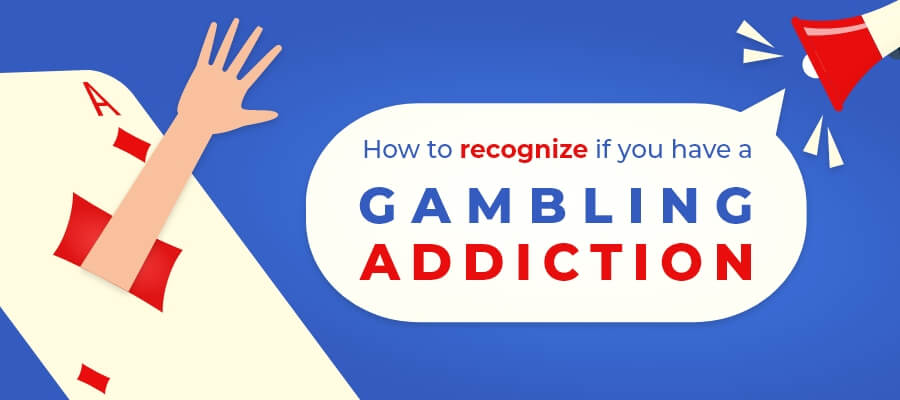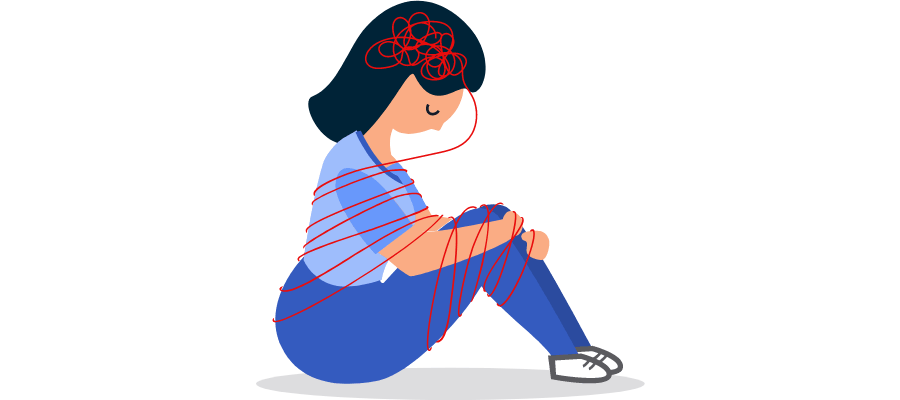How to Recognize If You Have Gambling Addiction

On SlotsMate we put a lot of emphasis on safe play and responsible gambling. We’re always encouraging our users to stay away from addiction. Should addiction arise, there are several ways in which you can stay in control. Moreover, if you find yourself dealing with a gambling problem upon reading this article, you can receive help.
PLEASE NOTE
According to recent research from the University of Buffalo, as many as 750,000 young people, ages 14 to 21 have a gambling addiction.
That being said, if you find yourself at risk and you’re too afraid to tell your loved ones, we’re here to help. We’re committed to offering you, our user, a safe gambling environment and that’s why we’re here to provide useful resources.
Without further ado, let's jump right in!
6 Types of Compulsive Gambling

According to the Trafalgar Addiction Treatment Centers, there are six types of gamblers out there. Not every type described here represents someone who’s addicted.
However, each of these types have addictive traits that can eventually lead to full-blown gambling addiction.
That being said, let’s take a look at the six types of gamblers:
-
Antisocial Gambler. The antisocial gambler is a person who might suffer from antisocial personality disorder. This type of gambler has been identified as most likely to engage in illegal gambling. They may also have a history or problematic behaviour, manipulation, deceitfulness, impulsivity or lack of remorse.
-
Professional Gambler. The professional gambler sees gambling as an occupation, rather than a hobby. This person will not consider themselves addicted and will always rely on statistics and calculations when they play. They will often pick the games or bets they believe to have the best odds.
-
Serious Social Gambler. For the serious social gambler, casino games are the main source of entertainment. While they can control their gambling habits to a point, they’re more likely to develop a full-blown addiction after a traumatic event, during extreme anxiety caused by stress or after an “impossible” win.
-
Casual Social Gambler. The casual social gambler sees casino games as one of their many forms of entertainment. They will not bet very often and when they do, they’re fully aware of the risks associated with this activity.
-
Escape Gambler. The escape gambler will play casino games to get away from their problems. To them, gambling is an emotional relief from boredom, angriness, loneliness or anxiety. While having more control over their gambling habits than the compulsive gambler, this type of player still remains highly vulnerable.
-
Pathological Gambler. The pathological gambler has lost all control over their gambling habits. The sad thing about this type of gambler is that this is usually not their only addiction - they tend to abuse drugs or alcohol as well.
Do You Have a Pathological Betting Habit?

According to recent studies, pathological gambling has been recognized as a mental disorder. Usually, people who suffer from this disorder display one or more of the following:
-
Preoccupation. They often think about their gambling sessions, past, present, or future.
-
Tolerance. As it’s the case with substance abuse, the pathological gambler will always feel the need to raise their stakes to experience the same rush.
-
Withdrawal. When they attempt to reduce or cut off gambling completely, they will experience symptoms of withdrawal such as irritability or restlessness.
-
Escape. They only gamble to escape their problems or to improve their mood.
-
Chasing losses. Pathological gamblers will always attempt to win back the losses caused by gambling with more gambling.
-
Lying. They will always try to hide the extent of their gambling by lying to friends, family or even therapists.
-
Loss of control. They have already tried to reduce or cut off gambling but with no success.
-
Illegal acts. The pathological gambler has broken the law in order to fuel their gambling habits.
-
Risked an important relationship. They will still gamble despite risking losing (or have already lost) an important relationship, a job, or a significant opportunity.
-
Bailout. They will turn to family or friends for financial help to cover for the losses they suffered because of gambling.
-
Biological bases. They have a lack of norepinephrine, the hormone that controls stress levels.
RECOMMENDATION
If you find yourself meeting any 5 of these criteria, you could be affected by a gambling addiction. You can visit our Safe Gambling page for more resources on how to deal with problem gambling.
Problem Gambling Triggers
 It’s not known exactly what causes people to become addicted to gambling.
It’s not known exactly what causes people to become addicted to gambling.
However, Mayo Clinic has identified a few common triggers that could lead players onto this dangerous path. These triggers are also known as risk factors and while they don’t necessarily cause the problem itself, they could influence whether a person can have gambling addiction or not.
-
Age. Problem gambling is more common in young and middle-aged people. Those people who gamble during their childhood or teenage years are more exposed to the risk of becoming addicts in adulthood. Older people are also exposed to problem gambling, depending on other factors.
-
Mental health issues. People who fall prey to gambling addiction often have other issues with substance abuse, depression, anxiety or personality disorders. Pathologic gambling is also usually associated with OCD (obsessive-compulsive disorder), bipolar disorder or ADHD (attention-deficit disorder).
-
Peer pressure. If your friends and family have a gambling addiction, you’re also more likely to develop one. It doesn’t mean it will definitely happen but the chances are greater.
-
Gender. Problem gambling has been found to be more common in men than in women. Usually, women with gambling addictions have started playing later in life and got addicted faster.
-
Certain personality characteristics. There are several personality traits that make you more susceptible to problem gambling. Being highly competitive, being a workaholic, being restless, impulsive, or easily bored could increase your risk of developing a gambling addiction.
Negative Effects of Gambling

As it’s the case with any addiction, gambling addiction will negatively impact your life in several different ways. Some might be obvious, while some of them are more insidious and not as readily apparent.
-
Mental Health. One of the worst areas problem gambling will affect is your mental health. Gambling addiction will increase your levels of anxiety and depression while worsening any mental disorders you might already be suffering from. Gambling addiction can also lead to many other conditions, which can be developed either before or after you’ve got addicted. Pathological gambling can also lead to severe depression or even suicide in extreme cases.
-
Financial Health. As you might be aware of, problem gambling can cause extreme financial trouble. A problem gambler can quickly build a lot of debt, sometimes even resulting in poverty, bankruptcy or homelessness. Moreover financial problems are usually joined by legal problems, as some problem gamblers will resort to theft or other illegal activities to get money for their gambling habits.
-
Relationship Health. The people who are close to the addict also suffer. It’s not uncommon for members of these families to experience the side-effects of a gambling addiction. Even children who are not directly affected are more prone to develop gambling addictions themselves later in life.
How to Treat Gambling Addiction
 Experts from the University of Malaya Centre of Addiction Sciences have found several efficient ways to address and treat gambling addiction. Every person is unique but this advice could help anyone address problem gambling.
Experts from the University of Malaya Centre of Addiction Sciences have found several efficient ways to address and treat gambling addiction. Every person is unique but this advice could help anyone address problem gambling.
-
Acknowledge that you have a problem. The first step in healing is admitting and recognizing that you have a problem. Experts claim that without this first important step, you cannot efficiently treat your gambling addiction.
-
Replace gambling with other positive activities. It will be easier to give up on gambling if you find a good replacement for it. Try doing a sport, finding a new hobby, or even volunteering. Any positive activity that you can do instead of gambling will be of tremendous help.
-
Find support. Addictions in general are not easy to fight and overcome alone. Family and friends are usually good sources of support, provided you’ve told them about your problem.
-
Avoid falling into temptation. When you’re addicted, you must absolutely avoid any places or activities that might be tempting. Don’t go close to casinos, betting places, race tracks, poker sessions or anything that might trigger your desire to gamble.
-
Get professional help. If anything else fails (and even if it doesn’t), you should seek professional help. Finding a good therapist isn’t hard, especially when you have services such as BetterHelp that allow you to find a professional therapist from the comfort of your own home. When seeking professional help, you can also check out Gamblers Anonymous - a 12-step program - or engage in Cognitive-Behavioral Therapy.
Is Your Loved One a Compulsive Gambler?

If your loved one is struggling with a gambling addiction, it’s normal for you to want to help them. In the following section, we’ll be going through a few ways in which you can deal with your own emotions and help your friend, family member, or partner deal with their problem gambling.
-
Dealing with hopelessness. Despite everything, problem gambling is a very treatable condition. After treatment, a huge chunk of problem gamblers considerably reduce or stop gambling altogether. There’s no need to feel hopeless - it will get better.
-
Dealing with anger. It’s completely normal to feel angry. Afterall, your loved one’s gambling decisions have caused a lot of stress and pain for the ones around them. You can deal with this by recognizing some of the triggers we’ve talked about. Of course, these don’t absolve your loved one of responsibility - they will simply help you understand what motivated them and how this led to addiction.
-
Dealing with guilt. Sometimes, you might blame yourself for not doing more to prevent this issue. Maybe you think you should’ve seen it coming or your loved one even blamed you. This usually happens because they’re angry at themselves and take it out on you. You didn’t cause their addiction so there’s no need to feel guilty.
-
Dealing with feelings of betrayal. It can be shocking or hurtful to find out that a loved one has a gambling addiction. Just keep in mind that they didn’t do that to deliberately upset or spite you. Addictions are hard to keep under control.
Besides dealing with your own feelings, there are other measures you can take to protect both yourself and your loved one, such as:
-
Pay all the bills by yourself;
-
Protect all your valuable items by putting them in a safe;
-
Warn your friends, family or co-workers not to lend money to the addict;
-
Set up and manage a separate bank account;
-
Don’t leave cards or money in plain sight;
-
Change your credit or debit card PINs and don’t share them;
-
Cancel any overdrafts that might exist on bank accounts.
Stigma in Gambling Addiction

Studies from Taylor Francis have defined “stigma” as an attribute that is deeply discrediting. It reduces a person to a discounted one, leading to the devaluation of their social identity. Just as any other addiction, gambling is also associated with a certain level of stigma.
According to several surveys, people tend to place problem gamblers under certain hurtful labels such as: “stupid”, “foolish”, “weak”, “untrustworthy”, “secretive”, “lacking self-control” or “irresponsible”.
All of these terms suggest that people view gambling addicts as being entirely to blame for their situation due to failures of character.
IMPORTANT
Seeing as gambling addiction has been classified as a mental disorder, it’s important people address and deal with the stigma associated with it, while promoting actions against this stigma.
There are several ways in which institutions have already started combating this stain:
-
Treatments are available under more anonymity;
-
Broader availability of online services;
-
Replacing stereotypes with positive images;
-
Increasing the contact of communities with people with gambling problems.
Further Recommendations

The goal of this page is to help all our users gamble responsibly or even recognize a gambling addiction, should it arise. We aim to point them in the right direction by providing links and resources such as Gamblers Anonymous, self-exclusion guides, and institutions such as Addiction Center or the National Council on Problem Gambling.
At the end of the day, keep in mind that gambling should only be a fun hobby. When the fun stops, you should always seek professional help.
